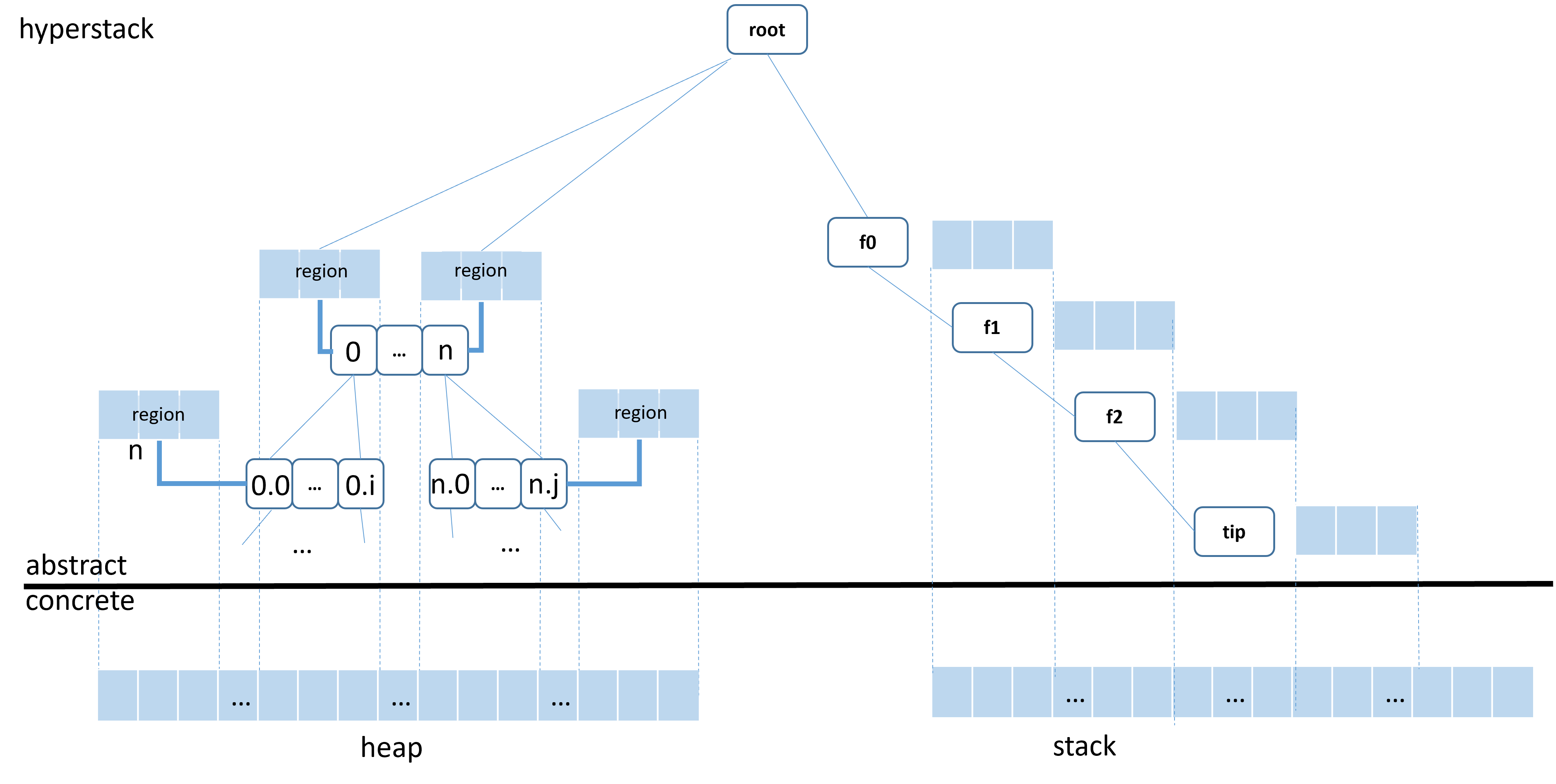Layering Effectful Languages
Richer Memory Models, Low*, and EverParse
Last time
-
… we saw how to deeply embed language and build certified tools for them
- Vale and its VC generator
-
… we saw how to shallowly embed effectful languages and reason about them with refined computation types
- Dijkstra monad for state
- Also, information flow controls (see the notes)
Richer Model of Mutable Memory
with Lens-indexed Imperative Lenses
Richer memory models
-
Program libraries to model memory, e.g., the ML or C heap
-
Derive effectful actions for primitive operations (e.g.,
!,:=etc.) -
Write effectful programs against these libraries and verify them with refined computation types
-
Extract them to programs in ML or C with primitive effects
F*:
let incr (r:ref int) : ST unit (requires fun h0 -> h0 `contains` r) (ensures fun h0 _ h1 -> sel h1 r = sel h0 r + 1) = r := !r + 1ML:
let incr (r:ref int) : unit = r := !r + 1C:
void incr (int *r) { *r = *r + 1; }
Modeling the ML heap
A sketch of FStar.Heap:
module Heap
let addr = nat
abstract let heap = {
next_addr: addr;
map: addr -> option (a:Type & v:a) {
forall a. h > next_addr ==> map a == None
}
}
abstract let ref t = addr
let contains h (r:ref t) = r < h.next_addr /\ h.map r == Some (t, _)
let sel h (r:ref t{h `contains` r}) = let Some (_, v) = h.map r in v
let upd h (r:ref t{h `contains` r}) v = ...
Deriving ML-like Effectful Operations
-
Reading references
let (!) #t (r:ref t) : ST t (requires fun h -> h `contains` r) (ensures fun h0 x h1 -> h0 == h1 /\ x = sel h1 r) = sel (get()) r -
Writing references
let (:=) #t (r:ref t) (v:t) : ST (ref t) (requires fun h -> h `contains` r) (ensures fun h0 x h1 -> h1 == upd h0 r v) = put (upd (get()) r v); r -
Allocating and freeing references …
Bidirectional data access, abstractly with lenses
type lens a b = {
get : a -> b;
put : b -> a -> a
}selandupdform a lenslet ref_lens : lens (heap * ref a) a = { get = fun (h, r) -> sel h r; put = fun v (h, r) -> upd h r v }
Imperative lenses
-
A lens-indexed computation type:
type st_lens inv (l:lens (heap * a) b) = { st_get : x:a -> ST b (requires fun h -> inv h x) (ensures fun h0 y h1 -> h0==h1 /\ y == l.get (h0, x)); st_put : y:b -> x:a -> ST a (requires fun h -> inv h x) (ensures fun h0 x' h1 -> h1, x' == l.put y (h0, x)) } -
(!) and (:=) are imperative lenses
let iref_lens : st_lens contains ref_lens = { st_get = (!); st_put = (:=); }
Low*: A shallow embedding of C in F*
-
Inherit the control constructs, modular structure and typing discipline, partial evaluation capabilities of F*
-
Verified programs are extracted as usual by F* to an ML-like language
-
Very similar to Coq's extraction to OCaml
-
Heavy use of erasure and partial evaluation
-
-
If the extracted program is first order, doesn't use unbounded inductive types (e.g., no list, tree etc.), … KreMLin emits the program to C after
-
translating F* types modeling C constructs to C primitives (e.g,
FStar.UInt64.ttouint64_t;array ttot*) -
monomorphizing
-
compilation of pattern matches
-
bundling fragments into compilation units
- …
-
A Demo of Low*
Applications of Low*
-
EverCrypt: A Fully Verified, High-performance Cryptographic Provider
-
EverParse: A Verified Parser Generator for Binary Message Formats
-
100s of thousands of lines of verified code developed in Low*
-
Deployments in many places, including Windows kernel, Linux kernel, Azure, Firefox, …
The Essence of Low*
-
HyperStack: A region-based memory model for stacks and heaps
- Building on a primitive notion of monotonic state
-
Heap reasoning with implicit dynamic frames
-
Libraries with specialized extraction via Kremlin
- Machine integers
- Arrays
- Looping combinators
HyperStack: The Low* Memory Model

- A key ingredient in defining this memory model, an effect of monotonic state: Recalling a Witness
Heap Reasoning with Implicit Dynamic Frames
let incr (p:pointer int)
: ST unit
(requires fun h0 -> h0 `contains` p)
(ensures fun h0 _ h1 -> modifies {p} h0 h1 /\ h1.[p] = h0.[p] + 1)
= p := !p + 1-
modifies l h0 h1, wherel : locabstracts an aggregation of memory locations -
Stateful specifications are heavily reliant on
modifiesfor “framing”- Describing only what changed, all other existing locations in the heap remained the same
-
Later, we'll see other ways to handle framing, notably with separation logic
Libraries with primitive support in KReMLin
abstract let array t = { len:nat ; base:ref (s:seq t {lengths = len}) }
let ptr t = a:array t{a.len = 1}
let contains m (a:array t) : prop = ...
let sel m (a:array t{m `contains` a}) : seq a = ...
let upd m (a:array t{m `contains` a}) s : mem = ...-
Array indexing:
a.[i]extracted to*(a + i)let ( .[] ) #t (a:array t) (i:nat) : ST t (requires fun h -> h `contains` r /\ i < a.len) (ensures fun h0 x h1 -> h0 == h1 /\ x == Seq.index (sel h1 r) i) = index (sel (get()) a) i -
Array update:
a.[i] <- vextracted to*(a + i) = vlet ( .[]<- ) #t (a:array t) (i:nat) (v:t) : ST unit (requires fun h -> h `contains` a /\ i < a.len) (ensures fun h0 x h1 -> h1 == upd h0 a (Seq.update (sel h0 a) i v)) = let h0 = get () in put (upd h0 a (Seq.update (sel h0 a) i v))
Automating Domain-specific Low* Proofs
-
You can program and prove code in Low* directly
- Lots of instances of that, but proofs are still hard
-
But, you can also metaprogram Low*
- E.g., HACLxN: Metaprogrammed vectorized cryptography and cryptographic agility
-
Or, build further proof-oriented DSLs on top of Low*
Manipulating Binary-formatted Data with the EverParse Combinator Library
Wrapping up
-
Write low-level code if you must
-
But, program it tastefully in a proof assistant, not directly in C or asm
-
Thoughtful structuring of imperative coding patterns can make reasoning about imperative programs similar to functional programming
-
And with proofs, partial evaluation and proof erasure, the resulting code can be significantly faster than hand-written C
